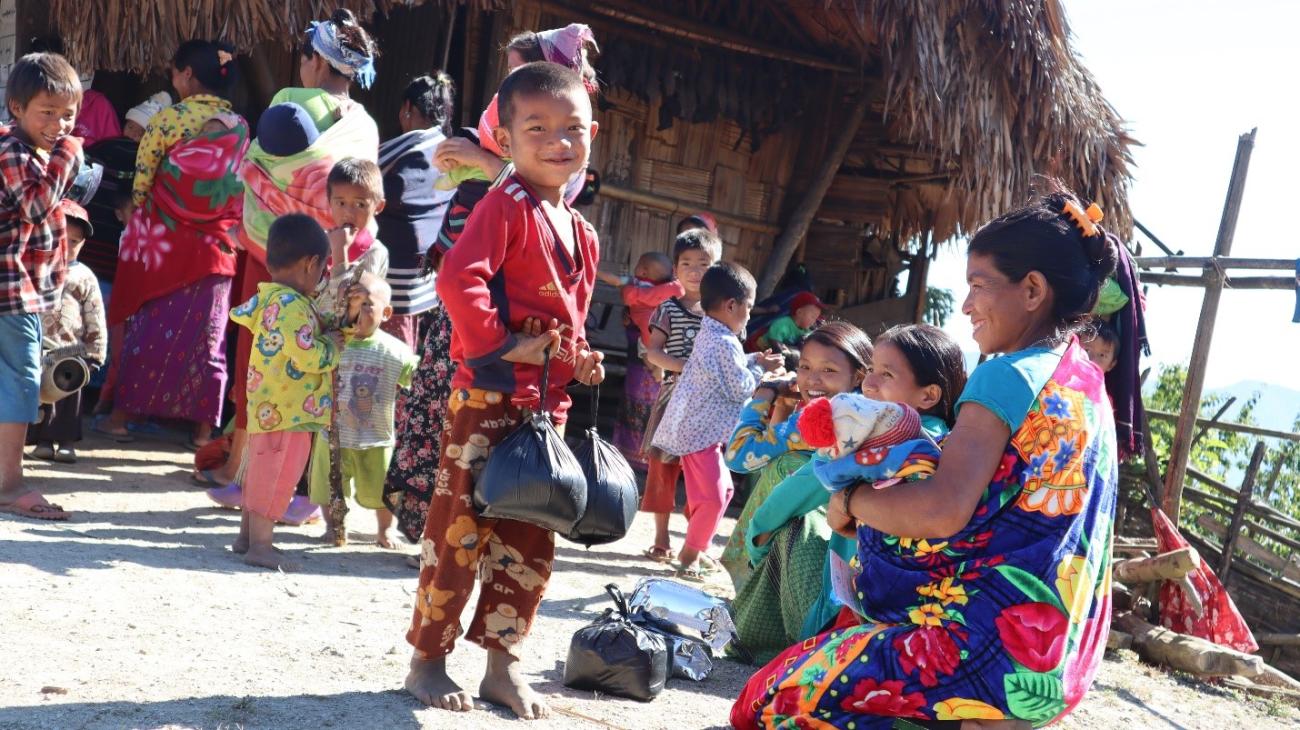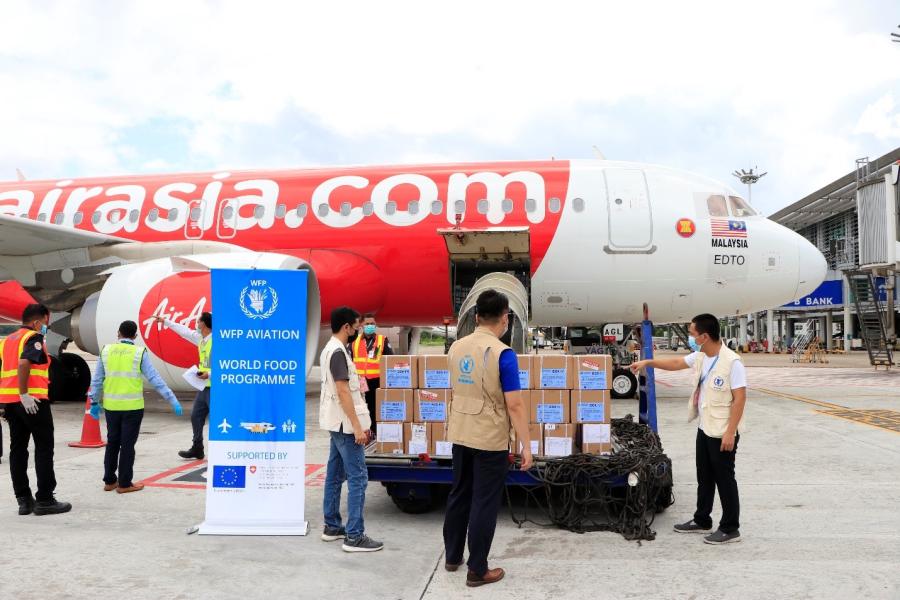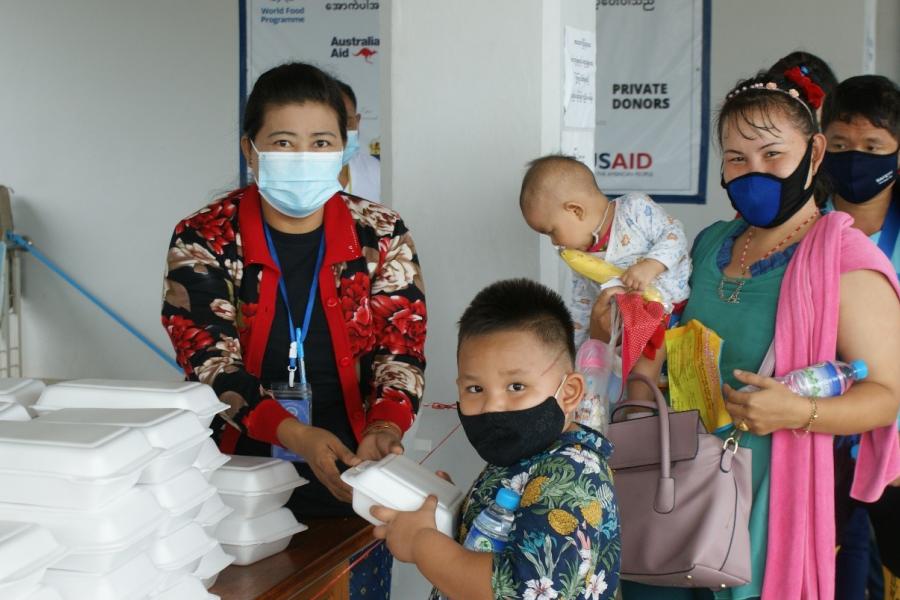WFP steps up food assistance and logistics support to help fight COVID-19 in Myanmar

The UN in Myanmar has come together as one to support COVID-19 preparedness and response. The article in our series highlights the work of WFP.
The UN in Myanmar has come together as one to support COVID-19 preparedness and response. The article in our series highlights the work of WFP.
The UN Secretary-General Antonio Guterres has said that ending the pandemic everywhere is both a moral imperative and a matter of enlightened self-interest. Extraordinary times demand extraordinary measures. We face a colossal test which demands decisive, coordinated and innovative action from all, for all. In Myanmar, the UN Country Team representing more than 20 agencies is supporting COVID-19 preparedness and response.
WFP steps up food assistance and logistics support to help fight COVID-19 in Myanmar
The United Nations emergency agency World Food Programme (WFP) has been able to provide food and nutrition assistance to tens of thousands of people affected by COVID-19.
The new programs with a range of Government and NGO partners had to be put in place without interrupting the existing projects which have been assisting half a million people a month prior to the COVID-19 outbreak.
WFP, one of the UN in Myanmar agencies, is the leading humanitarian organization saving lives delivering food assistance in emergencies and working with communities to improve nutrition and build resilience. On any given day, WFP has 5,600 trucks, 30 ships and nearly 100 planes on the move, delivering food and other assistance to those in most need all around the world, including about a million people in Myanmar.
Compared to many countries globally and in the region, the COVID-19 pandemic reached Myanmar relatively late, with the first confirmed case identified only in late March 2020.
The Government of Myanmar quickly took preventive measures which included closing borders and suspending international commercial flights. Meanwhile, closures of many businesses and factories in China and Thailand forced tens of thousands of Myanmar migrant workers to return home.
The Government set out to ensure returning migrants underwent proper quarantine before they reintegrated into resident communities but providing daily meals at quarantine sites proved to be one of the challenges.
In this complex context, WFP quickly moved to establish a logistics system for the aid community in Myanmar and to provide short term food assistance for the returning migrants while they were in quarantine. WFP is also supporting efforts to reduce the economic impact of the pandemic on the most vulnerable people – children and mothers giving birth or breastfeeding, while looking at ways to support people living in informal settlements who suddenly found themselves with less income.
Emergency logistics in a time needed most
On 10 May, the first of a series of WFP-chartered plane from Kuala Lumpur carrying COVID-19 medical supplies and aid workers landed in Yangon. This weekly connection, initially made possible with funding from the European Union and Switzerland, have proven a predictable and reliable support to humanitarian and development community to sustain their operations in Myanmar.
“Within ten round trips, our flights have brought in over six metric tonnes of urgently-needed supplies – including over 10,000 COVID-19 test kits, lab equipment and personal protective equipment, and transported over 160 personnel from scores of aid organisations and diplomatic missions,” WFP Myanmar Country Director Mr. Stephen Anderson said.
This essential air service will continue until international commercial flights resume.

Food assistance at the frontline
For a country with minimal local and community level transmissions of the COVID-19 virus, Myanmar’s border gates have become an important frontline as most confirmed COVID cases have their origins in foreign countries.
WFP has teamed up with the Government to provide food and nutrition assistance to the migrants who have arrived Myanmar which contributes to a well-organized quarantine management system.
As of early July, WFP has provided nutritious meals for 41,500 returning migrants upon their arrival through various border gates, and for 43,000 in quarantine sites in Kachin, Kayin, Mon and Shan states; as well as Ayeyarwaddy, Bago, Magway, Tanitharyi and Yangon regions.

Protecting the most vulnerable
COVID-19 can affect everyone, but its impact hits some much more severely than others, particularly those who are already vulnerable. While WFP continues its monthly assistance for nearly 500,000 people in Myanmar, adjustments were made to protect those deemed most vulnerable. At the same time, WFP continues to explore ways to best support those worst affected by COVID-19, including deepening support to government counterparts for the delivery of cash-based social protection assistance.
Because it was possible that access to sources of food maybe limited during the periods of restricted movement WFP doubled fortified blended food rations for 18,000 pregnant and lactating women to improve the nutrition status of pregnant and lactating women and boost their immune system to better withstand the impact of COVID-19 on food supplies.
Under WFP’s ‘’School Meals Programme’’ about 34,000 children receive cooked meals for lunch throughout the past academic year. But now as schools remain unable to reopen due to COVID-19, WFP provided cash support to fulfil their food needs while they stay at home.
The movement restrictions in place becase of COVID-19 have prevented many people working and others lost most of their their daily income. Although some business and factories reopened, many casual labourers and self-employed workers remain unable to resume their work and daily income. WFP is looking at implementing cash-for-work projects to provide income opportunities for those affected by COVID-19 while building community assets.
This is where WFP aims to provide such populations with cash as daily wages with a condition that they contribute their labour in building or rehabilitating small-scale infrastructure such as roads and bridges in their own neighborhood. WFP works with local authorities and communities to indentify and invite the most vulnerable and food-insecure people to participate in these asset creation projects. A project participant receives from WFP a cash amount that can buy daily food for his/her household.
WFP is also exploring how to best support those worst affected by COVID-19 in Myanmar, for example building on existing nutrition programmes in Yangon’s informal settlements to protect the poorest from slipping into alarming levels of food insecurity and malnutrition.
“Joint efforts from the Government of Myanmar and the international community need to be further intensified and sustained to prevent the COVID-19 pandemic from pushing many more people in Myanmar into hunger and malnutrition. Our greatest concern is for the most vulnerable and those families who have very limited and irregular income,” Mr. Anderson said.
Click here to read more about WFP’s response to COVID-19 in Myanmar.



